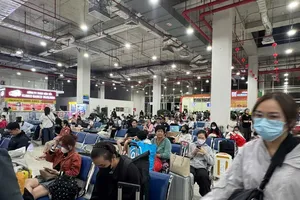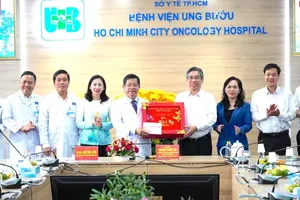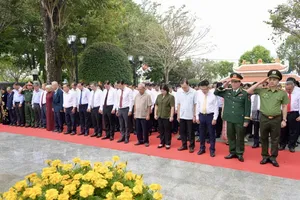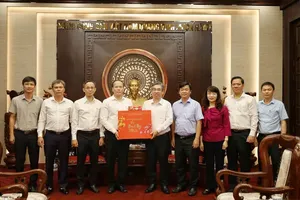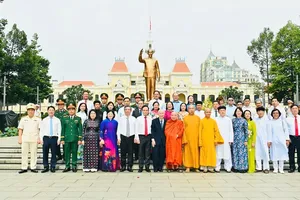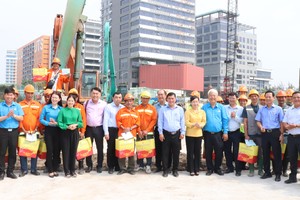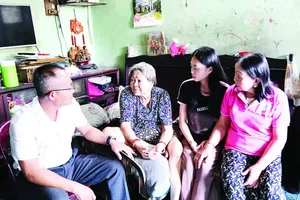 |
Deputy Prime Minister Le Minh Khai (L) and Chairman of Ho Chi Minh City People's Committee Phan Van Mai at the conference |
The State Bank was reporting at the workshop on ‘Data connection, smart payment - promoting social development’ co-organized yesterday afternoon by SBV and Tuoi Tre newspaper within the framework of the program ‘Cashless Day 2023’.
According to the State Bank, up to now, more than 75 percent of adults have a bank payment account. In the first 4 months of 2023, the number of non-cash payment transactions has increased dramatically via Internet channels and mobile phones, both in quantity and transaction value.
In particular, payment via the QR code method grew the most impressively with more than 161 percent in quantity and 36.6 percent in value over the same period in 2022. In contrast, payment via ATM decreased by 3.5 percent in quantity and 5.5 percent in value.
At the workshop, participants discussed the role and importance of data connectivity in smart payments and smart payment related issues to integrate, connect and link data between systems, agencies and fields, forming a digital banking ecosystem to further promote smart payment solutions, and innnovative payment services to satisfy people’s various needs.
Pham Tien Dung, Deputy Governor of the State Bank of Vietnam, said that the analysis and connection of data are decisive factors for the success of the process of promoting non-cash payments and digital transformation in the banking industry.
In the digital age, data can be used to understand and capture customer behavior and consumption trends, helping banks and businesses identify new opportunities and make the right decisions as well as improve operational efficiency.
Defining the important role of data in banking operations as well as the objectives and orientations of Project 06, the State Bank and banks and payment intermediaries have been actively implementing the application connection and the use of population data information in all banking operations, especially payment and credit in order to promote the development of non-cash payment, digital transformation in the economy.
Therefore, this year's conference aimed to contribute to the development of smart payment activities. Based on that, competent agencies, businesses and banks can exchange and share experiences in analyzing and sharing data among related sectors and fields in general; subsequently, non-cash payment will continue to grow in popularity in all aspects of life, said Mr. Dung.
Speaking at the event, Chairman of Ho Chi Minh City People's Committee Phan Van Mai said that leaders of the southern largest city are very interested in new trends such as the digital economy and non-cash payment. Ho Chi Minh City is prepared for the necessary steps as well as solutions to create the most favorable conditions for the city’s development.
Leaders of Ho Chi Minh City always welcome initiatives to accelerate cashless payments as the city has been oriented to cashless payments, emphasized Chairman of the city People's Committee Phan Van Mai.
So far, state agencies in the health, education, insurance, and transportation sectors in Ho Chi Minh City have made non-cash payments. He revealed that online public service level 4 in Ho Chi Minh City has reached 30 percent. In the coming time, Ho Chi Minh City will continue encouraging people not to use cash in paying through businesses and associations. Currently, Ho Chi Minh City has issued a data strategy and will soon deploy it as a platform for cashless payments.
Chairman Phan Van Mai also suggested that, in the current initial stage, there should be mandatory regulations to speed up cashless payments, for example, transactions of VND10 million (US$424) or more must be paid via banks.
He emphasized that leaders of the People's Committee of Ho Chi Minh City always welcome initiatives to accelerate cashless payments as the city aimed to lead the country in cashless payments.
